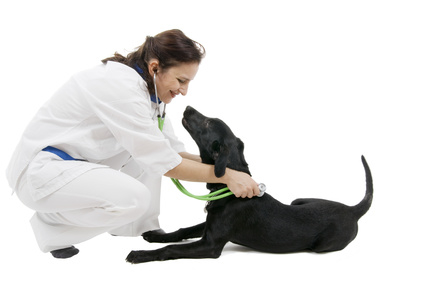A Common Labrador Retriever Health Concerns and Problems
When we think about Labrador Retriever health there are certain illnesses and diseases that we all fear and, whilst Labradors are generally healthy, there are some genetic disorders that they do tend to suffer from.
The most common genetic problems for Labs include PRA, Hip Dysplasia and Epilepsy.
Of course this isn't to say that your Lab is fated to suffer from any of the above but it does help to be aware of potential problems especially when choosing a Labrador puppy or if you are considering rescuing a Labradorfrom a dog shelter.

All dogs are susceptible to certain conditions and disorders and we explain much more elsewhere on the site about Labrador health. But here we will concentrate on those three common genetic disorders that we mentioned above.
Labrador Retriever Health - Hip Dysplasia
As a Labrador owner I know the sense of dread that envelopes you when you believe your beloved lab id suffering from hip dysplasia. Labs are very susceptible to this condition, as are many other of the larger breeds of dog, but they are not born with it.
Hip dysplasia develops over time and be very, very painful for the dog. Basically what happens is that the hip socket becomes abnormally deformed which causes crippling pain, arthritis in the bones and joints and lameness.
If you suspect your dog may may be suffering from hip dysplasia, perhaps you have noticed a slight limp when he runs, or maybe his leg looks crooked at the hip, then please take to the vet as soon as possible for an x-ray.
But, if the prognosis is hip dysplasia don't panic. Some dogs can show symptoms but never experience any pain or distress. Let me share a personal experience.
I became very concerned about one of my Labs at a very early age and took her to the vet. He diagnosed hip dysplasia and the X-ray did look horrific. The vet recommended an operation and was not confident that my dog would ever recover.
However, I sought a second opinion and whilst yes there is a problem there, it could be managed without surgery and with careful handling. Now the way she gallops about you wouldn't think there was ever any problem.
So don't despair, hip dysplasia can be managed and, if surgery is needed, modern techniques are amazingly effective.
Unfortunately of course not all stories have a happy ending and hip dysplasia can be very distressing so if in doubt consult a vet. You can find much more information on our page all about Labrador Hip Dysplasia.
Labrador Retriever Health - Epilepsy
Canine epilepsy can be inherited from a dogs parents and one of the questions you should ask Labrador Retriever breeders when thinking about buying a puppy is about any history of epilepsy in the parents.

Epilepsy means your Lab will suffer from seizures which are terribly upsetting for both the dog and the owner. Medication will be necessary to manage the illness if the seizures happen with any degree of regularity and you must follow your vets advice.
If your Labrador has a seizure the only thing you can do is to ensure that he doesn't hurt himself and provide reassurance by your presence.
Labrador Retriever Health - PRA
PRA, or Progressive Retinal Atrophy, is an eye disorder which will eventually lead to your Lab becoming blind. A Lab will develop PRA if both of its parents carried the gene and will gradually lose its sight. When only one parent has the gene than the puppy will become a carrier but will not show symptoms.
Thankfully PRA can be eradicated or at least controlled by responsible breeding. Simple blood tests can determine whether a Lab carries the PRA gene and a breeder who discovers his dog is a carrier will not, or at least should not, breed from that dog.
If you are worried that your Lab may be experiencing problems with his vision then take him to a specialist canine ophthalmologist. Your usual veterinary surgeon should be able to recommend a specialist in your area. You can find more information about eye problems on our Labrador Retriever health problems page.
Have A Labrador Retriever Health Question for our Veterinarian?
Do you have a Labrador Retriever health question? We'll answer it for FREE! Just fill out this form and our Vet will get back to you as soon as possible.
Please include information such as the sex, medical history, medications, changes in behavior, when symptoms first appeared and anything else you believe would be helpful. Please send a picture, particularly if the problem is skin, eye or ear related.
Questions are answered on a first come, first served basis and may take some time depending on the number we receive. If you have an urgent question, we suggest using this low cost online veterinary question servicethat has Vets standing by 24 hours a day, 7 days a week.
Related Articles
More About Labrador Retriever Health